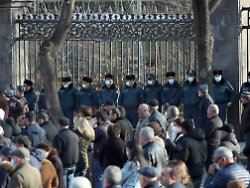Wednesday March 24th 2021
Nagorno-Karabakh conflict
Armenia cancels a state of war
After the loss-making war for Nagorno-Karabakh and months of domestic political crisis, Armenia is lifting the state of war. This clears the way for a step that the government and opposition in the ex-Soviet republic recently agreed on.
Armenia has lifted the state of war in the conflict region Nagorno-Karabakh in the South Caucasus. More than four months after the end of the fighting, the parliament in the capital Yerevan voted with a large majority, as reported by the Armenian media. The opposition had long called for this step. Martial law restricts the rights of the opposition and democracy as a whole, argued representatives.
The tension in Armenia was triggered by the end of the war over the conflict region Nagorno-Karabakh. Many compatriots blame the head of government Nikol Pashinyan, who has long been considered a beacon of hope and a potential fighter against corruption, for the loss of Armenian territory.
In the war from September 27 to November 9, 2020, the Muslim-influenced neighboring country Azerbaijan regained large parts of the area that it had lost in a similar conflict in the early 1990s. More than 6000 thousand people died in the clashes. Azerbaijan had already lifted the state of war in December.
Clear the way for new elections
The state of war in Armenia was lifted about a week after Prime Minister Pashinyan and the opposition agreed on early parliamentary elections in June. According to the Armenian constitution, this requires the abolition of the state of war. That hurdle is now out of the way.
New elections on June 20 are the best way out of the domestic political situation, Pashinyan said last week on Facebook. For months, the opposition has been demanding his resignation during mass protests. Pashinyan himself had defended the peace agreement as necessary because otherwise more soldiers would have died.
.
